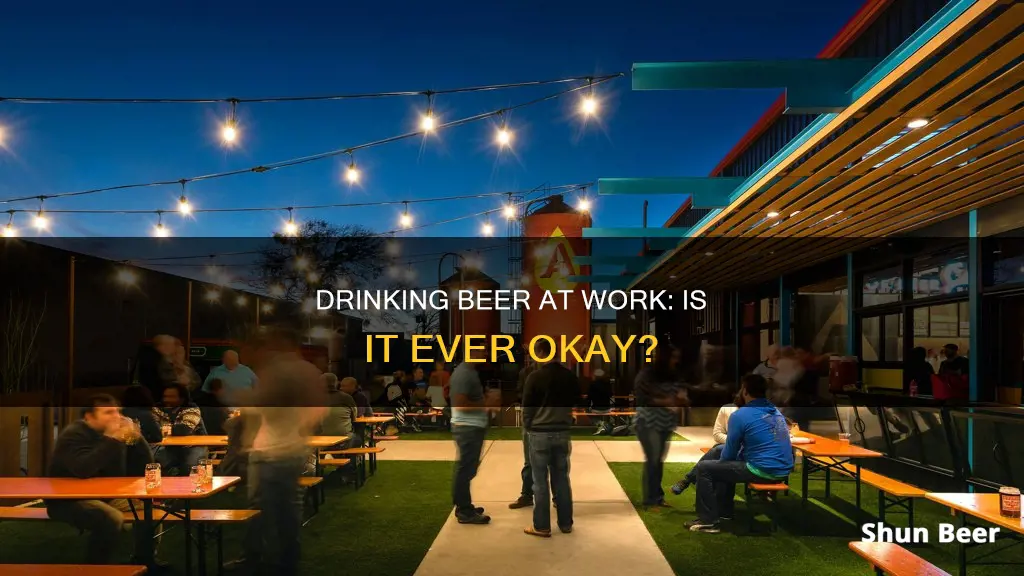
Drinking alcohol at work is a divisive topic. While some companies have gotten increasingly lax about alcohol in the workplace, from start-ups offering in-office bars to virtual happy hours, others have strict no-alcohol policies. The answer to the question of whether you can drink a beer at work depends on a variety of factors, including company policy, industry standards, cultural norms, and personal responsibility.
In some cultures, such as France, it is not uncommon for teachers to have a small glass of wine during their long lunch break. In Germany, it is acceptable for people to have a beer with their lunch, and this practice is not typically frowned upon. However, in the United States, drinking alcohol during work hours is often considered taboo and may even be against company policy.
There are both pros and cons to allowing alcohol in the workplace. Supporters argue that social drinking can improve employee performance, foster connections, alleviate stress, and improve creative problem-solving abilities. On the other hand, critics point out that alcohol can loosen inhibitions, leading to inappropriate conduct and potentially compromising the sobriety of recovering alcoholics. Additionally, allowing alcohol in the workplace may exclude employees with a history of addiction issues or religious beliefs that prohibit alcohol consumption.
Ultimately, the decision of whether to allow alcohol at work rests with individual companies and their HR departments. While there is no one-size-fits-all solution, having a clear and thoughtfully written policy about drinking alcohol at work is essential to set expectations and manage potential risks.
| Characteristics | Values |
|---|---|
| Acceptability | Drinking during work hours is generally considered unprofessional and inappropriate. However, there are some industries and companies where it is more common and accepted, such as advertising, tech start-ups, and creative professionals. It also depends on the country and its drinking culture. |
| Benefits | Improved employee performance, bonding, and recruitment. Reduced stress and improved creative problem-solving abilities. |
| Risks | Inappropriate conduct, exclusion of some employees, compromised sobriety of recovering alcoholics, and liability issues. |
| Company Policy | Some companies have a clear policy regarding alcohol consumption during work hours, while others may not address it specifically. |
| Individual Limits | The effects of alcohol vary from person to person, and some individuals may be able to consume a certain amount without it impacting their work. |
What You'll Learn

Drinking a beer at work can improve employees' creative problem-solving abilities
A study by Professor Jennifer Wiley of the University of Illinois at Chicago found that men with a blood alcohol content of 0.07 or higher solved 40% more problems than their sober counterparts and did so 3.5 seconds faster on average. The study, published in the journal *Consciousness and Cognition*, suggests that alcohol improves cognitive ability by creating a more flexible state of attention, which is more conducive to creative thinking.
Another study by Professor Andrew Jarosz of Mississippi State University found that male participants who consumed vodka-cranberry cocktails until their blood alcohol levels neared legal intoxication performed better on word association problems than a sober control group. The intoxicated participants not only provided more correct answers but also arrived at solutions more quickly.
It is important to note that the positive effects of alcohol on creativity and problem-solving are dose-dependent. The studies found that only a few drinks were optimal, with excessive consumption leading to impaired cognitive control and decreased creativity. Additionally, the effects of alcohol on creativity may be specific to certain types of creative tasks, such as insight problem-solving and divergent thinking.
While drinking a beer at work may not be appropriate or feasible in all contexts, the research highlights the potential benefits of moderate alcohol consumption on creative problem-solving abilities. However, it is crucial to consider the potential risks and negative consequences of alcohol consumption, including impaired judgment, increased accidents, and long-term health issues.
The Intricacies of a Beer Exchange: Trading and Sampling
You may want to see also

Beer at work can help employees bond and connect
Drinking at work is a divisive topic. While some companies have gotten increasingly lax about alcohol in the workplace, others have strict policies against it. Drinking at work can be a nice perk, but there are serious and practical concerns to consider, such as insurance, legal, and cultural fit.
Having a beer or a glass of wine with coworkers is a form of networking. When enjoyed in moderation, alcohol at work can help teams form new relationships and forge new bonds. It can be a symbol of trust and respect. It can also make employees feel more encouraged to socialise with coworkers they otherwise might not have met.
Progressive work environments typically offer free beer. Companies like Twitter, Facebook, and Yelp have perks such as beer-filled fridges or even a "keg refrigerator". If employees need to work long hours into the night, these companies show their appreciation by making work life more enjoyable with free booze.
Drinking can also aid the creative process. Alcohol can lessen our ability to focus on extraneous information while opening up passageways in the brain that benefit creative problem-solving. A study in the journal Consciousness and Cognition found that slightly intoxicated people solved problems more creatively than people who hadn't consumed any alcohol.
Potential Drawbacks
While drinking at work can help employees bond and connect, there are also potential drawbacks.
- It could compromise the sobriety of recovering alcoholics. Making alcohol readily available at work can make it extremely hard for those with an alcohol addiction to stay sober.
- It could make those who don't drink feel excluded.
- It could increase the chance of sexual harassment, and the company could be held liable for any legal repercussions.
- It could lead to inappropriate conduct. A study by Cornell University found that when the consumption of alcohol at work increases, so does the risk of harassment of women by male coworkers.
- It may lead to absenteeism, increased healthcare costs, injuries or accidents on the job, and damage to equipment or products.
- It may lower productivity and result in inappropriate behaviour.
- It may exclude some workers, such as those with a history of addiction issues, those whose religious beliefs prohibit the use of alcohol, or those who must abstain for other health issues.
- It may lead to peer pressure situations or uncomfortable conversations about why someone isn’t drinking.
Colorado EBT and Beer: What's the Deal?
You may want to see also

Beer with lunch is common in some countries
Drinking at work is a complicated issue, and opinions vary across different countries and cultures. While some countries have strict laws prohibiting alcohol consumption during working hours, others have a more relaxed approach, allowing employees to enjoy a drink with their lunch. Here are some insights into countries where drinking beer with lunch is common:
France: In France, it is not uncommon for teachers to enjoy a small glass of wine during their long lunch breaks. This practice is generally accepted and does not cause any issues. Additionally, in the corporate world, it is common for employees to have a beer or a small glass of wine for lunch, especially when dining with clients. This is seen as a way to facilitate business deals and build relationships.
Germany: In Germany, the consumption of alcohol and drugs in the workplace is not prohibited by law. As a result, there is no legal blood alcohol limit for employees, except for a few occupational groups such as bus and taxi drivers. In some regions, such as Lower and Upper Bavaria and Franconia, it is customary for employees to enjoy a glass of beer during their lunch break. However, if an accident occurs due to alcohol consumption, the employee may face legal repercussions.
Czech Republic: In the Czech Republic, there is a prohibition on consuming alcoholic beverages in the workplace and during working hours. However, this prohibition does not apply to employees working in adverse microclimatic conditions, such as foundries and glassworks. These employees are allowed to consume beer with a reduced alcohol content (not exceeding 1.2% in volume) as part of their work duties or cultural norms.
Other European Countries: While not as prevalent as in France or Germany, there are other European countries where drinking during lunch is not uncommon. For example, in Italy, employees in certain sectors, such as commercial drivers, have a blood alcohol concentration limit of 0.00%, strictly forbidding alcohol consumption while on duty. In contrast, Lithuania has a more relaxed approach, with a blood alcohol content limit of 0.02% for most workers. An exception is made for employees whose duties involve alcohol consumption, such as sommeliers, who are allowed a limit of 0.04%.
It is important to note that while drinking beer with lunch may be common in some countries, it is always essential to drink responsibly and ensure that it does not interfere with work performance or pose a safety risk. Each country has its own laws and cultural norms regarding alcohol consumption, and it is crucial to respect and adhere to these regulations.
Beer at Work: Is It Legal?
You may want to see also

Beer at work can lead to inappropriate conduct
Alcohol consumption at work can lead to inappropriate conduct, and this is a serious issue. Alcohol use is a significant phenomenon that constitutes an additional risk to pre-existing occupational hazards. It is estimated that between 5% and 20% of the working population in Europe have serious problems related to their alcohol usage. Alcohol use can lead to an increase in accidents, injuries, absenteeism, and inappropriate behaviour by reducing a worker's psycho-physical integrity, and significantly affecting the health and safety of third parties.
A study conducted by Cornell University found that when the consumption of alcohol at work increases, so does the risk of harassment of women by male co-workers. This can lead to expensive sexual harassment payouts.
Alcohol abuse can have a negative impact on work environments and employee performance. Many studies have found a significant correlation between workplace stress and high levels of alcohol consumption. Alcohol use has been shown to increase the risk of unemployment and, for those employed, absenteeism. It has also been found to increase the risk of tardiness at work and/or leaving work early, resulting in a loss of productivity; the development of inappropriate behaviour, such as theft and other crimes; poor relations with colleagues; and low company morale.
In conclusion, allowing alcohol consumption at work can lead to inappropriate conduct and negative outcomes for both individuals and organisations. It is important for employers to address this issue through policies, education, and support for employees struggling with alcohol abuse.
The Science Behind Beer Blizzard
You may want to see also

Beer at work can compromise the sobriety of recovering alcoholics
Alcoholism is a disease that can affect all aspects of a person's life, including their work life. The presence of alcohol in the workplace can have detrimental effects on employees struggling with alcoholism, and it is important to consider the potential impact on their sobriety. Here are four to six paragraphs elaborating on this topic:
Paragraph 1: The Impact of Alcohol in the Workplace
Workplace alcoholism and alcohol abuse have significant negative consequences, including lost productivity, increased healthcare costs, traffic accidents, and personal tragedies. The availability of alcohol at work can be challenging for recovering alcoholics, as it may trigger cravings and make it difficult for them to maintain their sobriety. It is essential to recognize that alcoholism is a disease and that the presence of alcohol in the workplace can compromise the sobriety of those struggling with this addiction.
Paragraph 2: The Challenges for Recovering Alcoholics
For recovering alcoholics, the easy access to alcohol in the workplace can be a constant temptation. It may trigger cravings and make it difficult to resist the urge to drink. Additionally, the social aspect of workplace drinking can create a sense of pressure to conform, making it harder for recovering alcoholics to abstain. The presence of alcohol in work settings can disrupt the sense of control that individuals in recovery have worked hard to establish.
Paragraph 3: The Importance of a Supportive Environment
A supportive work environment is crucial for employees struggling with alcoholism. While complete abstinence from alcohol may be the best option for some, others may benefit from alternative approaches, such as non-alcoholic beverages. It is important to respect the choices of recovering alcoholics and provide them with a safe and understanding environment. This may include offering non-alcoholic options at work events or respecting their decision to abstain from alcohol-related activities.
Paragraph 4: The Legal and Ethical Considerations
From a legal and ethical perspective, allowing alcohol in the workplace can raise concerns. Employers have a responsibility to ensure the health and safety of their employees. Providing alcohol or permitting its consumption during work hours may compromise this duty of care. Additionally, there are potential liability issues to consider if employees are allowed to drink during work. It is essential to balance the desire to create a relaxed and social work environment with the need to prioritize the well-being and safety of all employees, including those in recovery.
Paragraph 5: The Individual's Perspective
For individuals struggling with alcoholism, the presence of alcohol at work can be a constant reminder of their addiction. It may evoke feelings of temptation and trigger memories associated with drinking. Each person's journey to sobriety is unique, and what works for one person may not work for another. It is essential to respect individual choices and provide support to employees navigating their path to recovery. This may include offering resources such as employee assistance programs, referrals to healthcare providers, or support groups like Alcoholics Anonymous.
Paragraph 6: The Role of Non-Alcoholic Beverages
Non-alcoholic beverages, including non-alcoholic beer, have gained popularity as alternatives for those in recovery from alcohol addiction. These beverages allow individuals to participate in social gatherings without consuming alcohol. However, it is important to recognize that even non-alcoholic drinks may contain trace amounts of alcohol and can trigger cravings or emotional associations for recovering alcoholics. The decision to consume non-alcoholic beverages during recovery should be a personal choice, made with consideration of one's unique circumstances and triggers.
How Sales Jobs Can Be Your Dream Career
You may want to see also
Frequently asked questions
It depends on your company's policy. While drinking at work is uncommon in most sectors, individual businesses and companies may allow it. Generally speaking, small businesses and start-ups are more likely to allow/encourage drinking on the clock. Large corporations will almost universally outlaw it.
Drinking at work can incentivize employee performance, help employees bond and connect, save employees from tension meltdown, improve employees' creative problem-solving abilities, and improve recruitment and retention.
Alcohol loosens inhibitions, which can lead to inappropriate conduct and compromise the sobriety of recovering alcoholics. It could also exclude employees who don’t drink alcohol and lead to peer pressure situations. There are also liability issues that come with alcohol use.
Alternatives to drinking a beer at work could include drinking a non-alcoholic beer or having a coffee or tea break.







